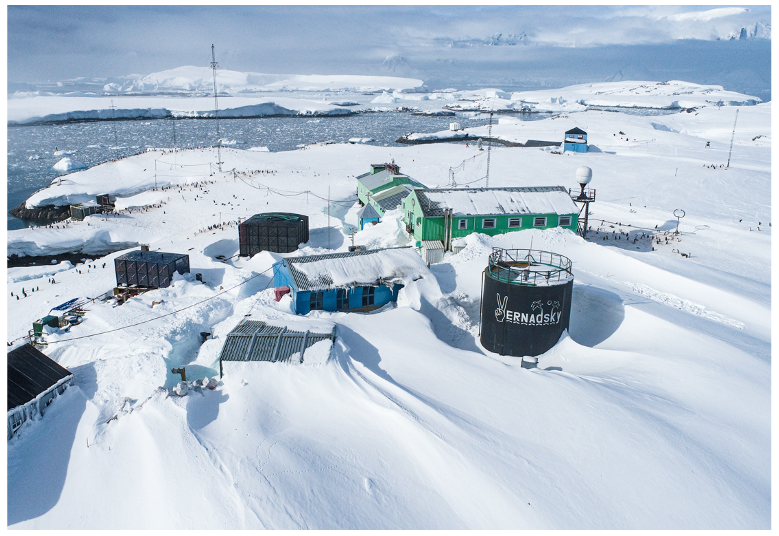Akademik Vernadsky Station, UA

Akademik Vernadsky Station, UA
The Akademik Vernadsky Station (AVS) is located at Galindez Island, Arentine Islands Archipelago.
The research complex of AVS enables comprehensive monitoring of environmental parameters in Antarctica at all levels of the geosphere – from tectonosphere to geospace. Research is focussing on geosciences and biological investigations. The station itself is a system with its own infrastructure, which ensures its operation throughout the year. All the year round 12-14 winterers work at the station.
The research complex is operated by the National Antarctic Scientific Center, Ukraine. Until 1996 it was the British Faraday station.
Contribution to POLARIN key research challenges: 1,2,3,4,5,6
Contact: RI operator: evgendykyi[at]gmail.com, andriyf[at]gmail.com
Website https://static1.squarespace.com/static/61073506e9b0073c7eaaf464/t/615636eec7ce0a6cbb96cd5e/1633040111795/Ukraine_Antarctic_Station_Catalogue_Aug2017.pdf
http://uac.gov.ua/en/vernadsky-station-en/
Location
Vernadsky station is located at Marina Point Galindez Island, Argentine Islands Archipelago, Kiev Peninsula, Antarctic Peninsula. The Antarctic Specially Protected Area (ASPA) 108 “Green Island, Berthelot Islands, Antarctic Peninsula” is situated 9 km to the South from Vernadsky. CEP Visitor Site Guidelines for nearest islands: Winter I., Petermann I., Pleneau I., Booth I., Yalour I. The station is located in the vicinity to relict Galindez Island Ice Cap (Woosle Hill), 51 m height.
Facilities
AVS consists of 12 constructions: a main building; two modules of non-magnetic material, where magnetometers are installed; an upper-air hall (is also used as a garage for four snowmobiles); a VLF-hut and a joiner’s shop, where two refrigerators are placed.
Facilities include laboratories, dining areas, communication centers, and recreational spaces to meet the diverse needs of researchers working in remote and challenging conditions.
Accommodation options range from dormitory-style quarters to individual cabins, depending on the expedition needs.
Observatories: Away from all buildings are two nonmagnetic halls of the Vernadsky Geomagnetic Observatory. These halls do not contain magnetic materials that would bring errors in the natural Earth’s magnetic field.
Services offered
Access to meteorological, biological, geomagnetic, ionospheric, ozonometric and seismological laboratories and to the meteorological, marine, and hydro-meteorological, biological, magnetometrical, ionospheric and VLF equipment. AVS operates year-round and is available for overwintering or short-term (1-3 month) research.
NASC offers technical support and expertise to help researchers set up experiments, deploy scientific instruments, and collect data in the field.
Verdansky maintains an inventory of research equipment available for rent, including sensors, sampling devices, and analytical instruments, to facilitate a wide range of scientific investigations.
Technical staff are available to provide training and assistance with equipment operation, maintenance, and troubleshooting throughout the duration of the expedition.
What is included in the Access
Unit of access: User/day
Modalities of access offered: In-person access, remote access
All costs related to using the facilities as well as accommodation and full board are included.
The typical duration of work ranges from 1 to 12 months. Users will be integrated into the scheduling of the infrastructure and, after coordination with the base commander, can use infrastructure independently.
Availability for access in the 2024 call
Vernadsky station is available from the mid-December to the end of March.
For remote access, station is available year-round.
Time frame for access preparations
Documentation from RI users is typically received within a designated timeframe (usually 14 days) after access is granted, ensuring that all necessary preparations can be made in advance of the expedition. Logistic arrangements to access the RI are also coordinated within specific timeframes to streamline operations and optimize resource allocation.
Permits, licenses and training
Access to our RI requires permits and licenses issued by relevant national authorities, including environmental regulatory responsible to the obligation within Antarctic treaty. These permits ensure compliance with legal and environmental obligations and are obtained through a collaborative effort between our center and the expedition team.
RI users are required to undergo specialized training and certification to enhance safety and mitigate risks associated with Antarctic fieldwork. Training programs cover essential topics such as field survival skills, environmental stewardship, and emergency response protocols, ensuring that users are well-prepared for the challenges of conducting research in this remote and extreme environment
Medical guidelines
Prior to embarking on their expedition, RI users undergo comprehensive risk assessments to identify potential hazards and develop mitigation strategies. Health, safety, and environmental (HSE) requirements are strictly enforced throughout the duration of the expedition to minimize risks to personnel and the Antarctic ecosystem.
RI users are required to provide detailed personal information, including medical history, allergies, and food intolerances, to ensure that appropriate accommodations and provisions can be made for their well-being. Medical examinations and health checks may also be required to assess users’ fitness for Antarctic travel and mitigate health risks associated with the expedition.

